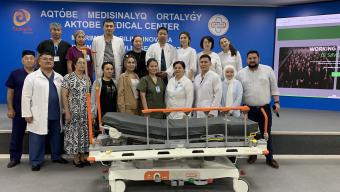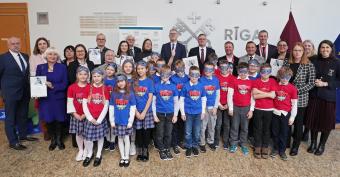Welcome to Malaysia’s city of firsts. The first tin mining town, the first railway station, the first post office, public park, prison and museum. The first Southeast Asian city to join the World Health Organization (WHO) global network of age-friendly cities and communities, and, officially since September 2025, the nucleus of Malaysia’s first Angels Region.
Our story begins in Malaysia’s oldest hospital, which back in 1897 was the first in Southeast Asia to install an X-ray machine. Now the lead hospital for a cluster of five hospitals that together serve the population of over 800,000 living in northern Perak, Hospital Taiping is where geriatrician and internal medicine specialist Dr Cheah Wee Kooi has been the driving force behind another very significant first.
Hospital Taiping is one of 29 major specialist hospitals in Malaysia, one tier below its 14 state hospitals – one for each state. Dr Cheah heads up the hospital’s Medical Department and its Clinical Research Centre, known for conducting high-quality, ethical research aimed at improving patient outcomes. Under his leadership, Hospital Taiping made history as the first stroke-ready hospital in Malaysia to provide thrombolysis for acute stroke without a neurologist. It is still among a handful of non-neurologist stroke centre offering a 24-hour service.
Building purpose in people
Before 2011, Dr Cheah says, stroke patients at Hospital Taiping were “everywhere”. They were admitted via casualty, distributed throughout the internal medicine department’s more than 200 beds, monitored and discharged. His first intervention was to create a dedicated stroke round – every Thursday morning, he’d lead a team composed of doctors, nurses, pharmacist, physio and occupational therapist, dietician and speech therapist on an extended walk to the bedsides of stroke patients scattered around the medical wards.
“It was our morning exercise,” he recalls.
His next move was to restructure the admissions system so that all stroke patients were assigned to a single ward divided between men and women. It made the stroke round more efficient and care more organized, but a further benefit, Dr Cheah says, was that the care teams, including physiotherapists, could see the progress resulting from their efforts. “It built purpose in people,” he says.
A swallow assessment for stroke patients delivered the next breakthrough. Introduced to post-acute care in 2011, it reduced all-cause pneumonia at the hospital by 24 percent. These measures was the foundation of their stroke unit, Dr Cheah says.
No neurologist, no problem
Thrombolytic treatment for acute stroke in Malaysia is generally limited to the availability of neurologists but these specialists are in short supply. Hospital Taiping had never had a neurologist, Dr Cheah says, nor was it likely to get one in the near future. But they were nevertheless determined to treat their stroke patients according to evidence-based guidelines. This was how, in 2012, having secured state funding initially for a small quota of patients, Hospital Taiping notched up a first that would change the outlook for victims of stroke.
Almost a decade later, a study published in the Medical Journal of Malaysia would find no significant difference in the clinical outcomes of stroke patients who’d been prescribed thrombolytic therapy by neurologists at Hospital Seberang Jaya, compared with patients treated at Hospital Taiping.
Data collection to demonstrate safety was a priority – and the habit of collecting data on outcomes and side-effects established a culture of quality monitoring that in Q1 of 2021 resulted in the first of five WSO Angels Awards.
Doing something that matters
When she was told the hospital had won four gold awards, she asked if there was anything above gold, says Dr Foo Sze-Shir, deputy director of Hospital Taiping since 2023. She got her answer when Dr Cheah and Angels consultant Dr Radha Malon introduced her to the Angels Regions strategy last year. Their goal would be a community-wide intervention to make their city safe for stroke, and Dr Foo’s gift for networking and her relationships with local authorities would be critical for success.
Dr Foo had entered medicine from a desire to be on the frontlines doing “something that mattered”, but the realization that there was “a bigger problem to be solved” steered her toward making and shaping policy, she says. She had always been interested in the field of non-communicable diseases, and when she was appointed to her current position two years ago, she was pleased to find an award-winning stroke service already in place.
Relishing the fresh challenge presented by the regional strategy, Dr Foo threw her weight behind the regional steering committee and engaged with the local health and education departments to win their support. Together, they would show the world what this old tin mining town was capable of.
The FAST Heroes program, which educates elementary school children about the signs of stroke, soon reached 777 children in the district, 350 of them as the result of hospital collaboration with Larut Matang and Selama (LMS) District Health Office, LMS District Education Office and Community Development Department (KEMAS).
This collaborative spirit saw Taiping City reach targets for community awareness, and diamond status in the EMS Angels Award for the emergency medical service. Hospital Taiping upped its own game to collect platinum, missing out on diamond by the narrowest of margins.
“You get an award when you’re ready, not when you chase after it,” Dr Cheah says, quoting a philosophical former teacher.
We have the willpower
The Malay word for stroke, angin ahmar, literally means “red wind”, and as Head of Emergency and Trauma at Taiping Hospital, Dr Azmir bin Anuar is at the exact point where the wind hits heaviest.
Low public awareness is the main reason many stroke patients arrive in his department too late for treatment, so for Dr Azmir’s team it made sense to lend a hand to the EMS and the FAST Heroes campaign. The more people able to recognize the signs of stroke and know the importance of calling an ambulance without delay, the more opportunities his team will have to give stroke patients a second chance.
In September, both he and his team participated in the FAST Heroes activation that saw 50 little heroes from five KEMAS kindergartens, and 300 learners from SK Pengkalan Aur, become equipped with a live-saving message to take home to parents and grandparents.
The comparative study of stroke treatment at Hospitals Seberang Jaya and Taiping concluded that the key to successful delivery of thrombolysis service lay with a streamlined stroke activation pathway and a dedicated multi-disciplinary team. On Dr Azmir’s watch, acute stroke management proceeds along an optimized pathway and with the active participation of emergency and general physicians, nurses, and radiologists, but there’s another factor the study authors may have overlooked.
“We may not have a neurologist,” Dr Azmir says, “but we have the willpower to act and take steps to combat this disease 24 hours a day. It’s all about the willingness to commit to managing stroke.”
Benefits multiply
If things go according to plan, Dr Azmir’s department is where the impact of the regional strategy should be felt first – in rising numbers of stroke patients who arrive at the hospital in time. But in time, benefits to the community are expected to reach beyond stroke. Dr Foo says: “With everyone involved, benefits are multiplied. It’s also good to get people on the same page, sitting together and talking about issues that concern all.”
Next up is a long-term impact study that will measure the effect of being an Angels Region. “We will feel real pride once we can demonstrate that we have improved the overall health of the population,” she says.
Dr Cheah agrees there are collateral benefits from becoming an Angels Region – such as a bridge between the region’s health and education ministries, and the intergenerational understanding that comes from involving school children in stroke education through the FAST Heroes program. “It’s positive for the community when children are aware of the needs of older people,” he says.
There’s natural synergy between an age-friendly community and a safe city for stroke – although
Dr Cheah, who also played a key role in the WHO project, prefers the idea of a city that is “friendly to everyone” – not only to the elderly but also “to moms with prams and people with disabilities”, many of whom are survivors of stroke.
As head of services for internal medicine in Malaysia and a catalyst for better stroke care in Taiping, does he have any advice for those who are eyeing Angels Region status and don’t quite know where to start?
“Just do it,” he says. “The need is real. Of course it’s best to prevent stroke but if you cannot prevent it, then you owe it to patients and their families to work together to give them a second chance.”
Acknowledgement
We would like to thank the Director General of Health Malaysia for his permission to publish this article.

